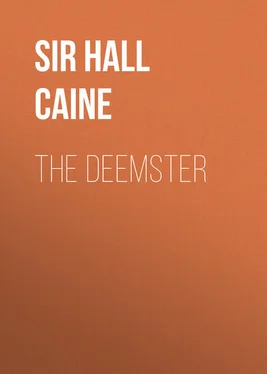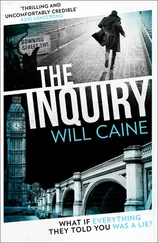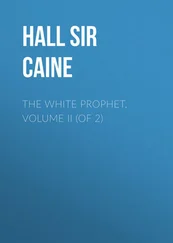Hall Caine - The Deemster
Здесь есть возможность читать онлайн «Hall Caine - The Deemster» — ознакомительный отрывок электронной книги совершенно бесплатно, а после прочтения отрывка купить полную версию. В некоторых случаях можно слушать аудио, скачать через торрент в формате fb2 и присутствует краткое содержание. ISBN: , Жанр: foreign_antique, foreign_prose, на английском языке. Описание произведения, (предисловие) а так же отзывы посетителей доступны на портале библиотеки ЛибКат.
- Название:The Deemster
- Автор:
- Жанр:
- Год:неизвестен
- ISBN:http://www.gutenberg.org/ebooks/35781
- Рейтинг книги:5 / 5. Голосов: 1
-
Избранное:Добавить в избранное
- Отзывы:
-
Ваша оценка:
- 100
- 1
- 2
- 3
- 4
- 5
The Deemster: краткое содержание, описание и аннотация
Предлагаем к чтению аннотацию, описание, краткое содержание или предисловие (зависит от того, что написал сам автор книги «The Deemster»). Если вы не нашли необходимую информацию о книге — напишите в комментариях, мы постараемся отыскать её.
The Deemster — читать онлайн ознакомительный отрывок
Ниже представлен текст книги, разбитый по страницам. Система сохранения места последней прочитанной страницы, позволяет с удобством читать онлайн бесплатно книгу «The Deemster», без необходимости каждый раз заново искать на чём Вы остановились. Поставьте закладку, и сможете в любой момент перейти на страницу, на которой закончили чтение.
Интервал:
Закладка:
"Humph! Doesn't look as if the daughter wanted for much. How does the girl come by her fine feathers if her mother lives on charity?"
Thorkell's wizened face was twisted into grotesque lines. His wife's face saddened, and her voice dropped as she hinted in faltering accents that "scandal did say – say – "
"Well, woman, what does scandal say?" asked Thorkell; and his voice had a curious lilt, and his mouth wore a strange smile.
"It says – I'm afraid, Thorkell, the poor girl is no better than she ought to be."
Thorkell snorted, and then laughed in his throat like a frisky gelding.
"I thought she looked like a lively young puffin," he said, and then trotted on in front, his head rolling between his shoulders, and his eyes down. After going a few yards further he slackened speed again.
"Lives near Peeltown, you say – a net-maker – Mally – is it Mally Kerruish?"
Thorkell's wife answered with a nod of the head, and then her husband faced about, and troubled her with no further conversation until he drew up at the church door, and said, "Quick, woman, quick, and mind you shut the pew door after you."
But "God remembered Rachel and hearkened to her," and then, for the first time, the wife of Thorkell Mylrea began to show a cheerful countenance. Thorkell's own elevation of spirits was yet more noticeable. He had heretofore showed no discontent with the old homestead that had housed his people for six generations, but he now began to build another and much larger house on the rising ground at the foot of Slieu Dhoo. His habits underwent some swift and various changes. He gave away no gray blankets that winter, the itinerant poor who were "on the houses" often went empty from his door, and – most appalling change of all – he promptly stopped his tithe. When the parson's cart drove up to Ballamona, Thorkell turned the horse's head, and gave the flank a sharp cut with his whip. The parson came in white with wrath.
"Let every pig dig for herself," said Thorkell. "I'll daub grease on the rump of your fat pig no more."
Thorkell's new homestead rose rapidly, and when the walls were ready for the roof the masons and carpenters went up to Ballamona for the customary feast of cowree and jough and binjean.
"What! Is it true, then, as the saying is," Thorkell exclaimed at the sight of them, "that when the sport is the merriest it is time to give up?"
They ate no cowree at Ballamona that night and they drank no jough.
"We've been going to the goat's house for wool," grunted one of them as they trudged home.
"Aw, well, man, and what can you get of the cat but his skin?" growled another.
Next day they put on the first timbers of the roof, and the following night a great storm swept over the island, and the roof-timbers were torn away, not a spar or purlin being left in its place. Thorkell fumed at the storm and swore at the men, and when the wind subsided he had the work done afresh. The old homestead of Ballamona was thatched, but the new one must be slated, and slates were quarried at and carted to Slieu Dhoo, and run on to the new roof. A dead calm had prevailed during these operations, but it was the calm that lies in the heart of the storm, and the night after they were completed the other edge of the cyclone passed over the island, tearing up the trees by their roots, and shaking the old Ballamona to its foundations. Thorkell Mylrea slept not a wink, but tramped up and down his bedroom the long night through; and next morning, at daybreak, he drew the blind of his window, and peered through the haze of the dawn to where his new house stood on the breast of Slieu Dhoo. He could just descry its blue walls – it was roofless.
The people began to mutter beneath their breath.
"Aw, man, it's a judgment," said one.
"He has been middlin' hard on the widda and fatherless, and it's like enough that there's Them aloft as knows it."
"What's that they're saying?" said one old crone, "what comes with the wind goes with the water."
"Och, I knew his father – him and me were same as brothers – and a good ould man for all."
"Well, and many a good cow has a bad calf," said the old woman.
Thorkell went about like a cloud of thunder, and when he heard that the accidents to his new homestead were ascribed to supernatural agencies he flashed like forked lightning.
"Where there are geese there's dirt," he said, "and where there are women there's talking. Am I to be frightened if an old woman sneezes?"
But before Thorkell set to work again he paid his tithe. He paid it with a rick of discolored oats that had been cut in the wet and threshed before it was dry. Thorkell had often wondered whether his cows would eat it. The next Sunday morning the parson paused before his sermon to complain that certain of his parishioners, whom he would not name at present, appeared to think that what was too bad for the pigs was good enough for the priests. Let the Church of God have no more of their pig-swill. Thorkell in his pew chuckled audibly, and muttered something about paying for a dead horse.
It was spring when the second roof was blown down, and the new house stood roofless until early summer. Then Thorkell sent four lean pigs across to the Rectory, and got his carpenters together and set them to work. The roofing proceeded without interruption.
The primrose was not yet gone, the swallow had not yet come, and the young grass under the feet of the oxen was still small and sweet, when Thorkell's wife took to her bed. Then all Ballamona was astir. Hommy-beg, the deaf gardener of Ballamona, was sent in the hot haste of his best two miles an hour to the village, commonly known as the Street, to summon the midwife. This good woman was called Kerry Quayle; she was a spinster of forty, and she was all but blind.
"I'm thinking the woman-body is after going on the straw," said Hommy-beg, when he reached the Street, and this was the sum of the message that he delivered.
"Then we'd better be off, as the saying is," remarked Kerry, who never accepted responsibility for any syllable she ever uttered.
When they got to Ballamona, Thorkell Mylrea bustled Hommy-beg into the square springless car, and told him to drive to Andreas, and fetch the Archdeacon without an hour's delay. Hommy-beg set off at fine paces that carried him to the Archdeaconry a matter of four miles an hour.
Thorkell followed Kerry Quayle to the room above. When they stepped into the bedroom Thorkell drew the midwife aside to a table on which a large candle stood in a tall brass candlestick, with gruesome gargoyles carved on the base and upper flange. From this table he picked up a small Testament bound in shiny leather, with silver clasps.
"I'm as great a man as any in the island," said Thorkell, in his shrill whisper, "for laughing at the simpletons that talk about witches and boaganes and the like of that."
"So you are, as the saying is," said Kerry.
"I'd have the law on the lot of them, if I had my way," said Thorkell, still holding the book.
"Aw, and shockin' powerful luck it would be, as the old body said, if all the witches and boaganes in the island could be run into the sea," said Kerry.
"Pshaw! I'm talking of the simpletons that believe in them," said Thorkell, snappishly. "I'd clap them all in Castle Rushen."
"Aw, yes, and clean law and clean justice, too, as the Irishman said."
"So don't think I want the midwife to take her oath in my house," said Thorkell.
"Och, no, of course not. You wouldn't bemean yourself, as they say."
"But, then, you know what the saying is, Kerry. 'Custom must be indulged with custom, or custom will weep;'" and, saying this, Thorkell's voice took a most insinuating tone.
"Aw, now, and I'm as good as here and there one at standing up for custom, as the saying is," said the midwife.
Читать дальшеИнтервал:
Закладка:
Похожие книги на «The Deemster»
Представляем Вашему вниманию похожие книги на «The Deemster» списком для выбора. Мы отобрали схожую по названию и смыслу литературу в надежде предоставить читателям больше вариантов отыскать новые, интересные, ещё непрочитанные произведения.
Обсуждение, отзывы о книге «The Deemster» и просто собственные мнения читателей. Оставьте ваши комментарии, напишите, что Вы думаете о произведении, его смысле или главных героях. Укажите что конкретно понравилось, а что нет, и почему Вы так считаете.












